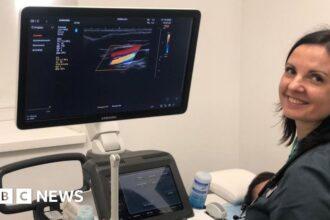According to the Economic Complexity Index, Georgia ranked 116th in the world for GDP in 2019, number 123 for total exports and number 103 for total imports. It was also the 108th in terms GDP per capita, and the 64th in terms most complex economy.
The preliminary data of the National Statistics Office of Georgia, Geostat, shows that the top three trading partners of Georgia, in terms of total external trade turnover, in 2021, will be Turkey ($2.1 billion), Russia ($1.6billion, up $789.1million in 2020), and China ($1.4billion, up $646.3million in 2020).
In 2021, Georgia’s external merchandise trade (excluding un-declared trade), was $14,315.6 millions, a 25.6% increase over 2020. Exports were $4,242.3 (26.9% more than the previous year) and imports were $10,073.3 ($25.1$ higher). Geostat reported that the negative trade balance in 2021 was $5,831.0 millions, and its share of external trade turnover was 40.7%.
GEORGIA TODAY spoke to Fatma Yazgan, the Ambassador of Turkey in Georgia to discuss Turkish-Georgia commercial relations and future prospects.
How long has Turkey “done business” and invested in Georgia? What are some of the key moments in the history of relations?
The Protocol for Establishing Diplomatic Relations between Turkey and Georgia was signed 30 years ago, following the collapse the USSR. After the opening of Sarpi Border Gate, in 1989, business ties were established in the form of trade and investment. Trade developed organically due to the proximity of the two countries and the complementary flow of supply and demand. The presence of families and ethnic groups on both sides of the border helped to develop these relations very quickly.
Sisecam, in Ksani Factory, was the first Turkish company to invest in the production of glassware. Geocell, a communications technology later sold, was the next major investment. Tourism investments began in Batumi and have been growing in Tbilisi over the last decade.
TAV built and operates the airports of Tbilisi, and Batumi, which have been important milestones for demonstrating Turkish investors’ trust in Georgia. In the last decade, we’ve seen textile manufacturers from Turkey move a number investments to Georgia. Paravani, which is owned by the Turkish Anadolu Group, is one of the first HESs built in Georgia today with foreign investment. The joint projects bring Georgians, Azerbaijanis and Turks together. Multinational corporations involved in regional connectivity and the energy transition are also worth mentioning. BTC, TANAP and BTK are pioneering project.
According to the United Nations COMTRADE database, Georgia imported $1.41 Billion worth of goods from Turkey in 2020. The majority of this was made up of iron/steel and plastics. However, the list is long. How has the pandemic affected trade? How are the challenges being met?
In 2020, we saw a slight drop in the volume of bilateral trade due to the pandemic. In 2021, however, the trade volume reached an all-time high of $2.1 billion. We saw a rise in both the exports to Georgia from Turkey and the exports to Georgia from Turkey. We would like to improve this trade volume by introducing more Turkish brands that are competitive in quality and price to the Georgian Market as the purchasing power increases.
Wildfires devastated the Turkish agriculture industry last year. Georgia will import $21.53 million worth of edible fruits, nuts and citrus peel from Turkey, as well as $18.79 million worth of edible vegetables, tubers and roots, and $15.08 million worth of meat and edible offal. How have the fires impacted Turkey’s exports and exports to Georgia specifically?
Wildfires in 2021 caused the destruction of hundreds of thousands hectares of forest, greenhouses, and animals. Due to other environmental and economical variables such as climate changes, droughts, and increases in raw material prices, it is difficult to estimate how the wildfires will affect agricultural exports. The world economy has been affected, and Turkey and Georgia are no exception.
We are interested in focusing on the cooperation in the fields of technology, services, and the renewable energy sector in Georgia. We are concerned about the energy security of Georgia and its transparency. We also think there is a lot of potential in tourism relations, bringing more Turkish tourists into Georgia.
In 2020, Georgia imported packaged pharmaceuticals worth $51.05 million from Turkey. Georgia opened up its pharmaceutical market for Turkey this year. What was the origin of this deal, and what are the expectations of Turkey and Georgia?
The Turkish pharmaceutical industry has developed and is well-developed. The health system, regulatory state, and size of the Turkish market are all very different.
We welcome the decision by the Georgian Government to provide fair competition for Turkish pharmaceutical companies in certain licensing requirements, as was done in other countries ten years ago. We believe, on the other hand that in order to improve public health and accessibility of people in Georgia to more affordable medications, there needs to be further discussion with multiple actors within Georgia. The Turkish government and Turkish pharmaceutical industry are ready to share with all interested parties the best practices in Turkey.
What do you think of the future of South Caucasus, given the emerging Armenia-Turkey relationship?
After the 2020 Nagorno Karabakh War, Turkey and Armenia began a new process. Both countries appointed Special Reps to negotiate, and their first meetings took place on 14 January in Moscow. The press release issued by the Ministries of Foreign Affairs of Turkey & Armenia also states that the meeting was held in a constructive and positive atmosphere. The parties agreed to continue the negotiations without any preconditions in order to achieve full normalization. Normalization will have positive results in terms of enhancing the development of the economy of the region, maintaining peace and stability.
In 2020, we saw a slight drop in the volume of bilateral trade due to the pandemic. In 2021, however, the trade volume reached an all-time high of $2.1 billion. This was due to a rise in both exports to and from Turkey, as well as exports to Georgia.
What will be the impact of opening a corridor through Armenian land on Georgia’s position
While there is a lot of speculation raised by some circles on this issue, I would like to reiterate once more that Georgia is a strategic partner of Turkey and as we have mentioned previously, there had been a number of important regional projects that had been realized with the Georgia-Turkey-Azerbaijan partnership. We believe that a simultaneous, comprehensive, and inclusive development of connectivity, trade, and framing the interests in a mutually advantageous way are steps we should follow to sustain peace and stability in our area. We should not fear inclusivity, dialogue and developing new perspectives in the future.
What are the prospects and aspirations of Turkey doing business with Georgia? What can (or is being) done to increase investment and trade?
A new protocol was signed in December 2021 during the visit of our Deputy Minister of Trade Mustafa Tuzcu. This protocol was to facilitate trade. This protocol shows that Turkey has agreed to allow more Georgian exports into Turkey. We would also like to concentrate on the cooperation in the fields of technology and services. The interest of Turkish companies in the Georgian renewable energies sector continues. We place great importance on the transparent and sustainable energy safety of Georgia. We also believe there is potential in tourism relations for an increase of Turkish tourists who enjoy nature and cultural tourism. I am still amazed that the Turkish tourists who are part of this segment have not been properly educated about Georgia’s potential. We also think that Georgian producers have a misconception about entering the Turkish market. Borjomi has entered large retail outlets in Turkey for the first year. We have also seen 10% of the 1 million liter quota of Georgian wine being exported to Turkey. We also support Turkish companies in exploring agricultural production for export to Georgia.
EXCLUSIVE Interview by Katie Ruth Davies
Read More @ georgiatoday.ge













